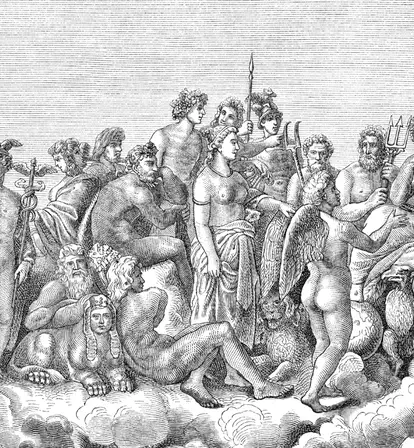From Apollo to Zeus, the 12 Olympian gods and goddesses are the most powerful deities in the pantheon of ancient Greek mythology and religion.
The Greek gods — and the Roman gods they inspired — represent antiquity’s most well-known pantheon. Immortalized not just in ancient myths and legends, they’ve also given their names to the planets of the solar system, while films, television, video games, and modern literature have all adapted the tales of the Greek gods to tell entirely new stories to this day. In the Western world, although they are no longer worshipped, the 12 Olympians’ influence is virtually inescapable.
There are, of course, thousands of stories about the Greek gods. They make frequent appearances in various myths, which served a variety of purposes. The Greek gods were often used to personify otherwise unexplainable events like storms, bad harvests, war, tidal waves, etc. The gods of ancient Greece were, however, not infallible. They meddled in human affairs, squabbled with one another, demanded sacrifices, fell in love, sired children, felt jealousy, and sought validation. The Olympian gods were characters as much as they were deities.
Unlike the Judeo-Christian God, the Greek gods did not create the universe. They were the children of a group of immortals known as the Titans, also known as the Elder Gods, who were themselves the children of an even more ancient pair of primordial beings, Uranus and Gaia. Together, Uranus and Gaia gave birth to six male Titans — Oceanus, Coeus, Crius, Hyperion, Iapetus, and Cronus — and six female Titans — Theia, Rhea, Themis, Mnemosyne, Phoebe, and Tethys. They also bore the three Cyclopes and the three Hecatoncheires.
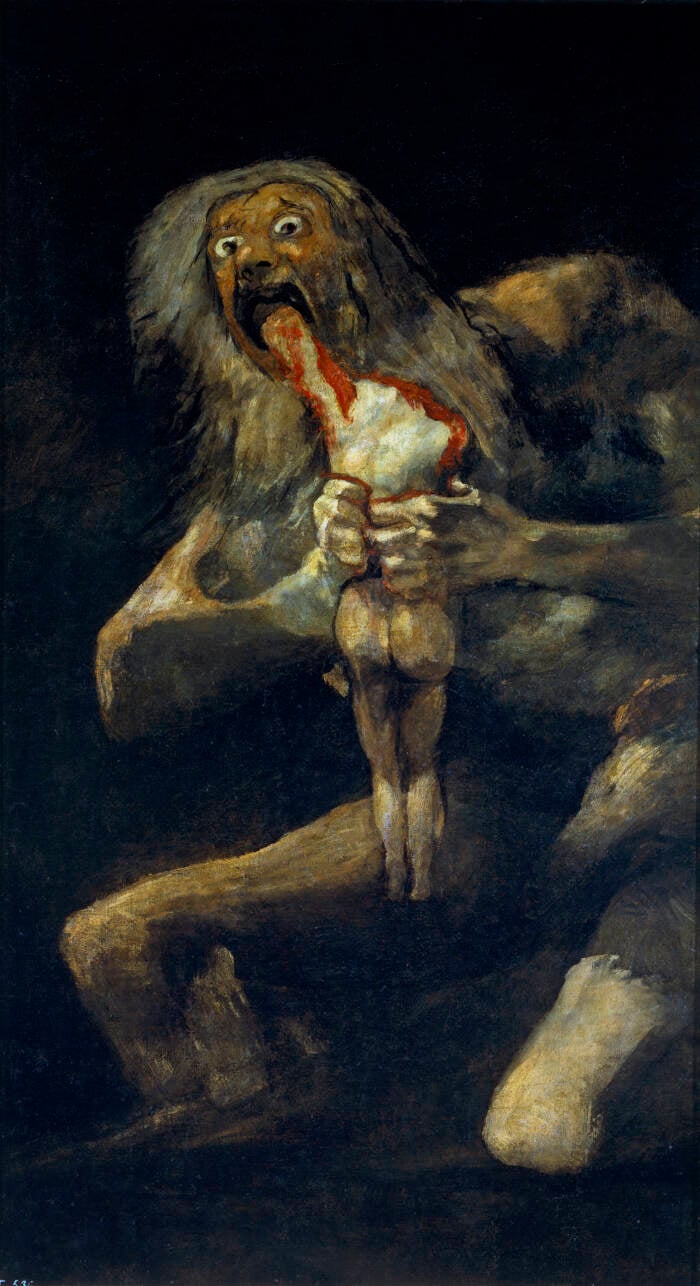
Wikimedia CommonsSaturn Devouring His Son by Fransisco Goya. A depiction of the Titan Cronus (known to the Romans as Saturn) eating his children, fearing they would one day usurp him.
Cronus and Rhea would go on to bear the first generation of the Olympian gods of ancient Greece: Zeus, Hades, Poseidon, Hestia, Demeter, and Hera.
But when Uranus, ashamed of his children, hid them away within Gaia, she grew angry. She wanted her children to punish their father, but none were willing — except for one, Cronus, the youngest of the Titans. Lying in wait with an adamantine sickle, Cronus attacked Uranus, castrating his father when he came to lay with Gaia. The Titans were now free, and Cronus controlled the cosmos.
His rule would not last forever, however, Gaia and Uranus told him. Just as Cronus had done, they prophesied that one of his own children would rise up against him and usurp his throne. So, when Cronus and Rhea later wed and bore their own children, Cronus devised a horrific plan: he ate the children Rhea birthed. The Greek gods and goddesses Hestia, Demeter, Hera, Hades, and Poseidon — all of these Olympians were devoured by their own father.
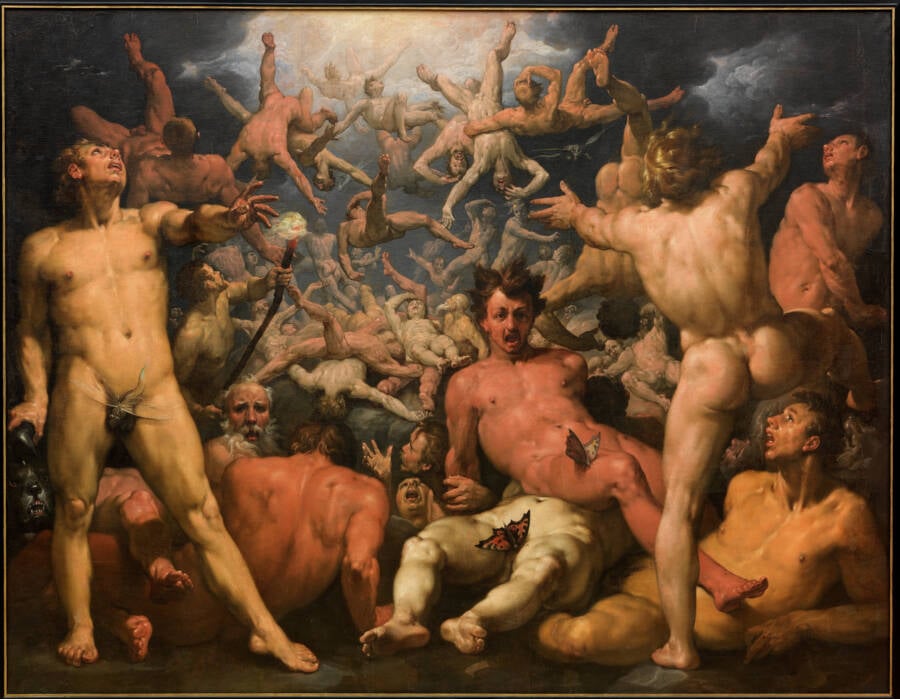
Wikimedia CommonsThe Fall of the Titans by Cornelis Cornelisz van Haarlem.
Only one Titan child was spared this fate: Zeus. Hidden away by Gaia when he was born, Zeus bode his time. When he was fully grown, Zeus tricked Cronus into disgorging his siblings, unleashed the Cyclopes and Hecatoncheires, and started the great war known as the Titanomachy. The Titanomachy lasted 10 years, ending with Zeus striking the Titans down with the mightiest of all weapons, the thunderbolt.
Although the Titans could not die, Zeus banished them to Tartarus, a deep abyss that would serve as the Titans’ prison. The time of the Titans came to an end; the time of the 12 Olympians gods and goddesses of ancient Greece was here.
This is the story of the 12 Olympian Greek gods, from the mythology that tells their tales to the real-world history that surrounds them.
Greek Gods: Zeus, The King Of The 12 Olympians
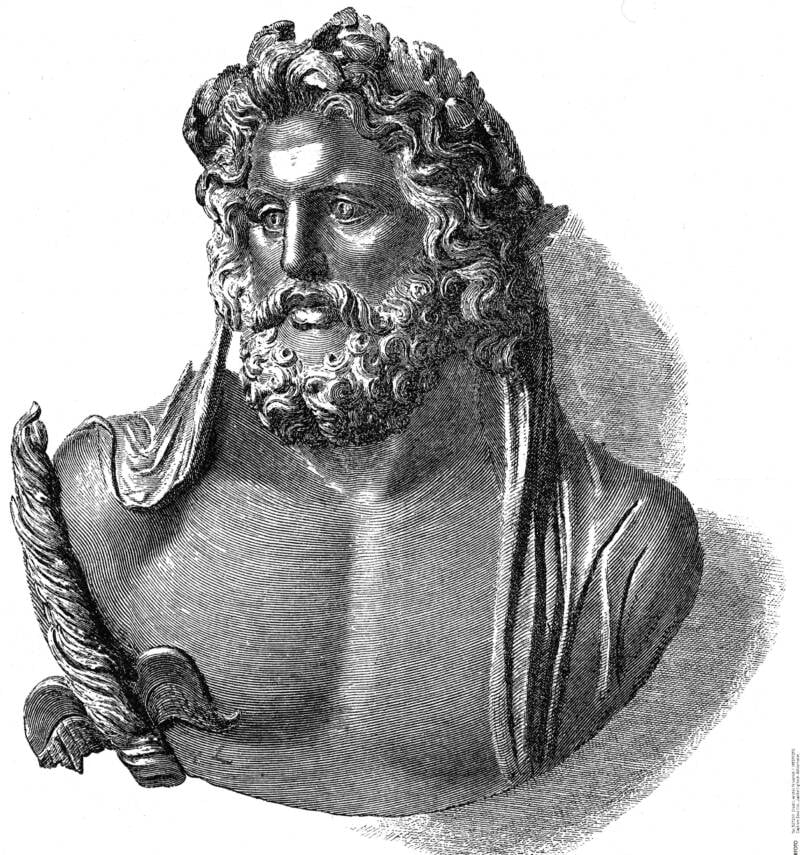
INTERFOTO/Alamy Stock PhotoZeus, the king of the 12 Olympian gods of ancient Greeks (known to the Romans as Jupiter).
With the Titans vanquished, the rule of the 12 Olympians began. Zeus and his brothers, Poseidon and Hades, divided control of the universe among them. Hades took control of the underworld, Poseidon was given domain over the seas, and Zeus ruled the skies — and with it, the Greek gods themselves.
In Homer’s Iliad, Zeus tells the other Greek gods, “I am the mightiest of all. Make trial that you may know. Fasten a rope of gold to heaven and lay hold, every god and goddess. You could not drag down Zeus. But if I wished to drag you down, then I would. The rope I would bind to a pinnacle of Olympus and all would hang in air, yes, the very earth and the sea too.”
Lacking humility, Zeus was often depicted as the strongest of the gods in ancient Greece, though not without faults of his own. He was not omniscient nor omnipresent, and his hubris occasionally allowed other gods to pull one over on him. Zeus also engaged in countless erotic escapades, siring both divine and mortal children with a variety of divine and mortal lovers — including disguising himself as a swan and “making love” to a human woman. Among the children Zeus sired were the Greek gods and goddesses Apollo, Artemis, Hermes, and Dionysus, and the mortal heroes Perseus and Hercules.
As folklorist Edith Hamilton notes in her extensive work, Mythology, Zeus’ penchant for falling in love with mortal women was something of a contentious point, even in ancient Greece. Scholars have said that Zeus, as he is known today, was likely a combination of several gods. As such, when the Greek pantheon was adopted by new towns who had already revered another deity, parts of their personality — and their relationships — were then transferred to Zeus (much in the same way that pagan traditions are often re-tooled to fit Christian beliefs).
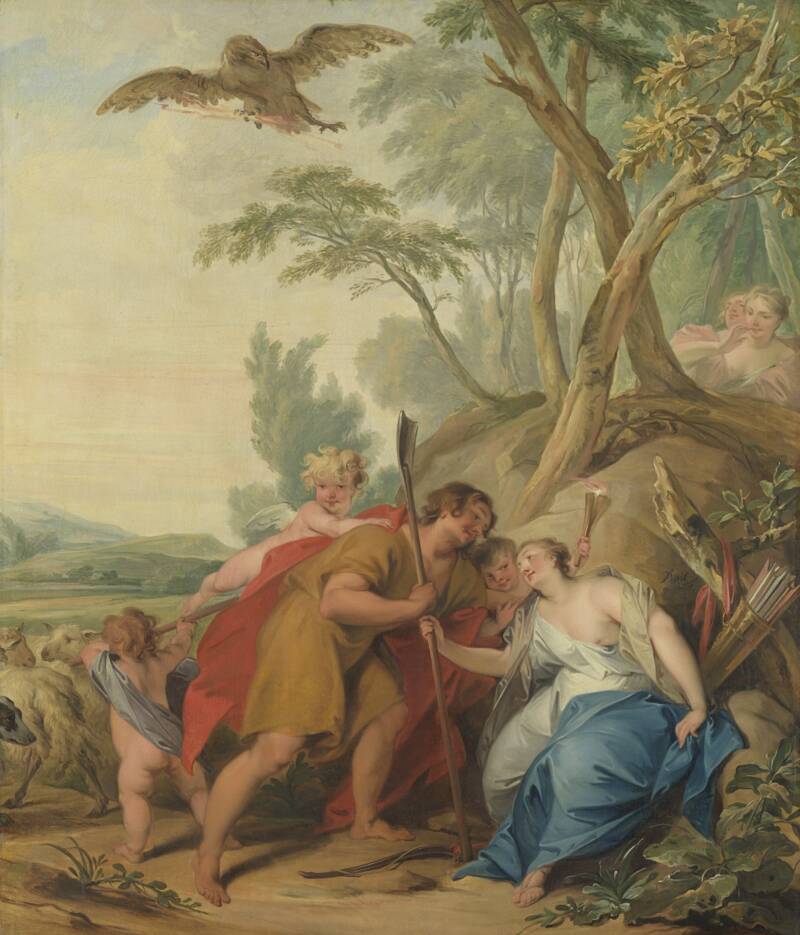
Public DomainJupiter, disguised as a shepherd, tempts Mnemosyne by Jacob de Wit.
Zeus’ rule did not go unchallenged. The other gods and goddesses of the 12 Olympians often engaged in conflict against the Giants, offspring of Gaia born from Uranus’ blood as it fell upon her. Zeus was also challenged by the monster Typhon, a monstrous serpentine giant (of conflicting parentage) who battled Zeus for rule of the cosmos. Most accounts, however, state that Zeus overpowered Typhon with relative ease.
Zeus was also said to have had seven wives, the first of whom was Metis, an Oceanid daughter of Oceanus and Tethys. Metis, while pregnant with Athena, was then swallowed by Zeus, who feared, as his father had, that he would be overthrown by his own son. Athena, Zeus’ daughter, would then be born by emerging from his head.
Zeus then wed Themis, a Titan, three of the Fates — Clotho, Lachesis, and Atropos — the Oceanid Eurynome, Demeter, the Titan Mnemosyne (bearing the nine Muses), the Titan Leto (bearing Apollo and Artemis), and finally Hera. It should be noted, however, that in some accounts, Hera is Zeus’ first and only wife.
Naturally, given Zeus’ status as the leader of the Greek gods, worship of him was widespread across the ancient Greek world. The most renowned sanctuary dedicated to Zeus could be found at Olympia, home to the Olympic Games, which were held in his honor. He was also worshipped at the site of the oracle of Dodona in Epirus, where priests interpreted the rustling of oak leaves as messages from Zeus, offering guidance to those who sought his counsel.
There were numerous traditions meant to honor Zeus, including sacrificing animals like bulls, goats, and sheep and the pouring of libations as acts of devotion and appeasement.
In addition to the Olympic Games, worshippers celebrated Zeus through the festival known as Diasia, celebrated in Athens. The festival involved sacrifices and offerings to Zeus Meilichios, an aspect of Zeus associated with mercy and purification. During the festival, participants offered animal-shaped cakes and engaged in communal feasting, hoping to appease the king of the Greek gods and avoid his wrath.
